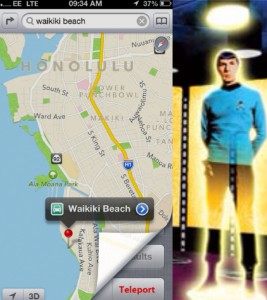Getting lost and disorientated, is something that happens to many people recognised with neurological differences such as: Dyslexia, Dyspraxia, Aspergers and ADHD; but is that such a bad thing?
Being dyslexic and ADHD, getting lost can be a regular occurrence, this doesn’t always bode well when time is not on your side and you have a meeting to get to. So, if I get disorientated, the numerous applications on my iPhone help me get from place to place, whether travelling on foot, public transport or by car. As of yet, I haven’t learned how to fly a helicopter or aeroplane, but “I’m sure there is an app for that”. However, the thing I’m waiting for the most is the Teleportation app. I imagine that I would be able get my surfboard and gear together (already have a water proof iphone case), find Waikiki beach in Honolulu on my maps app and press the red “Teleport button”. I’m not sure what the EE network charge would be for a human body email attachment.
A consideration must be given to how getting lost, at times, can have its pluses: if you take the route that everyone takes, you will be seeing what everyone has seen; getting lost may allow you to discover something that may have been overlooked. I’m sure Christopher Columbus would have agreed, had he not got lost, one could postulate that we may not have Big Macs or Cadillacs (which in my eyes is not a bad thing!).
Just a thought! The next time you get lost, try not to get anxious, allow yourself to become aware of the environment around you, concentrate on your breath to help you relax. You will be seeing something new, from seeing something new and being aware of these new surroundings your brain is making new connections…. and who knows what you might find?
Here is an of interesting article about orientation and the brain.
Spatial orientation and the brain the effects of map reading and navigation

